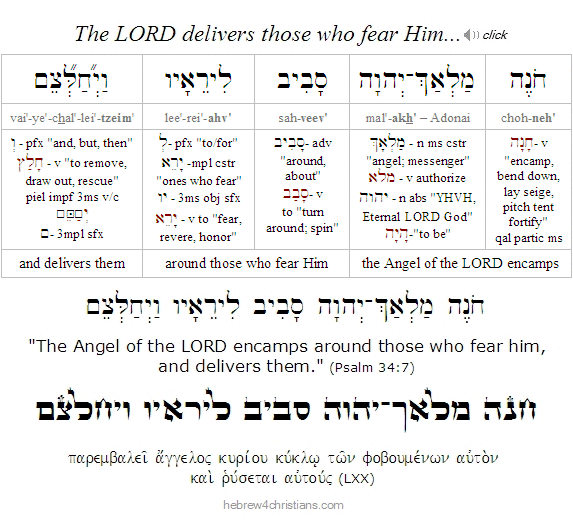|
In Hebrew, an "angel" is called malakh (מַלְאַךְ), a word that basically means "messenger" or representative (from the root לאך, meaning "to send"). God created many angels, of course (Psalm 68:17, 103:20), but there there is one malakh who stands out from all the rest of the malakhim (angels) as a King stands above his subjects. This "King of Angels" is called Malakh Adonai (מַלְאַךְ יהוה), or "the Angel of the Lord." Unlike the other angels that function as emissaries of God, Malakh Adonai is the supreme representation or Message of God Himself. His Word/Voice is "one" with the Person of God, just as the Spirit of God is "one" with the Person of God. Since the glory and power of God's infinite Being is incomprehensible to finite creatures, the Angel of the LORD is a form of God's condescension in a visible or audible manner so that an angel or a human being can apprehend His message....
This unique King of the Angels (מלך המלאכים), or "Angel of the LORD," is named in about 50 verses of the Tanakh (i.e., "Old Testament"), though he is alluded to in various other places as well (e.g., Gen. 18:1-ff; Gen. 48:16, Exod. 23:20-23, etc.). He is first mentioned in Genesis 16:7-13 where He is clearly called God. After he spoke with Hagar in the desert, she called him "the LORD" (יהוה) and identified Him as El-Roi (אֵל ראִי) -- the "God who sees me" (Gen. 16:13). He later appeared to Abraham in the grove at Mamre (Gen. 18:1-ff) to reaffirm the promise of a coming heir, and later still, during the most terrifying moment of the sacrifice of Isaac, he cried out to stop Abraham from bringing down the knife on his son (Gen. 22:11, see also Gen. 22:15-ff). And note especially that it was the "Angel of the LORD" who appeared to Moses in the "burning bush" and identified himself as YHVH, the "God of Abraham, Isaac, and Jacob" (see Exod. 3:2-ff).
Other examples from the Tanakh should be noted. The Angel of the LORD helped Gideon deliver Israel from Midian (Judges 6:11-13); he prophesied regarding the birth of Samson (Judges 13); he led Elijah to Mt. Horeb (1 Kings 19); he commanded David to build an altar which later became part of the Holy Temple (1 Chron. 21:18), and he is mentioned in Psalm 34:7 ("The Angel of the LORD camps around those who fear him") and in Psalm 35:6-7. In light of all this, it is clear that that Malakh Adonai is nothing less than a manifestation of the LORD Himself. Indeed, the prophet Isaiah calls him the "Angel of His Face" (מַלְאָךְ פָּנָיו, Isa. 63:9). And since Yeshua is the "radiance of the glory of God and the exact imprint of his nature, who upholds the universe by the word of his power" (Heb. 1:3), it is clear that He is the Angel of God's face -- the "message of God" -- that was "sent" (לאך) in human flesh (John 1:1,14). Yeshua is the King of Angels -- He is the Angel of the LORD! Indeed, Yeshua is none other than Melekh Ha-kavod (מֶלֶךְ הַכָּבוֹד) the King of God's Glory (Psalm 24) and Adonai Tzeva'ot (יהוה צְבָאוֹת), the LORD of the heavenly host.
Hebrew Lesson
Psalm 34:7 Hebrew reading (click):
|



